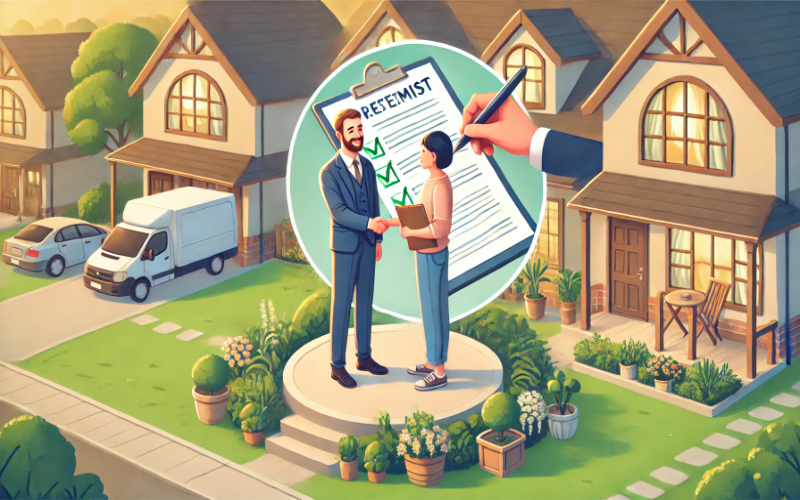Nov 11
How to Manage a Positive Landlord-Tenant Relationship for Long-Term Returns
Investing in rental properties is about much more than just signing leases and collecting rent checks. Building a strong, positive relationship with your tenants is essential for long-term success and financial returns. It’s about choosing the right tenants, setting clear expectations, and fostering a sense of trust and respect.
But how can you consistently balance professionalism and respect for privacy? And how can technology streamline these processes to make them even more effective? Answering these questions is crucial for landlords who want to unlock the full potential of their rental investments and foster relationships that last.
Why A Positive Landlord-Tenant Relationship Matters?
Building positive relationships in the rental industry fosters trust and cooperation, which benefits both landlords and tenants. When both parties work well together, tasks like repairs, rent collection, and property maintenance are managed more smoothly and efficiently. A strong landlord-tenant relationship can also give you a competitive edge, as satisfied tenants are more likely to renew their lease and even recommend your property to others.
Tips For Successful Landlord-Tenant Relationship

Below are actionable steps for landlords to cultivate and maintain strong relationships with tenants, from transparent communication to prompt maintenance. Implementing these practices will position you as a proactive, responsive, and professional property owner.
Establish Clear and Open Communication Channels
Clear communication is essential for building trust and maintaining tenant satisfaction. It helps prevent misunderstandings, establishes transparency, and shows you as an approachable, professional landlord. Start the relationship on a positive note—consider sending a welcoming letter that outlines property policies, maintenance guidelines, and your contact information. This provides tenants with easy access to key information and sets a professional tone from the beginning.
Regular check-ins, whether quarterly or biannually, can also be valuable. These periodic touchpoints give tenants the opportunity to share feedback, allowing you to address concerns proactively.
Communication doesn’t always have to be face-to-face. A simple email or text to check if everything is okay can go a long way without invading their privacy. When tenants reach out, respond promptly—acknowledge their inquiry within 24 hours, and let them know when they can expect a resolution. This approach demonstrates that you value their comfort and satisfaction, helping to build a stronger, positive relationship.
Be Open About Policies and Expectations
Establishing clear, well-defined policies from the start can help prevent confusion and minimize conflict. A detailed lease agreement serves as the foundation of a positive landlord-tenant relationship, outlining both parties' responsibilities when it comes to maintenance, noise levels, guest visits, and pet policies. When these expectations are clearly stated, tenants better understand their role, which reduces the likelihood of disputes.
Being open to reasonable tenant requests—like allowing pets or making small adjustments to the lease—when they don’t harm the rental property can foster goodwill and respect. This flexibility shows tenants that you value their comfort and preferences, strengthening your professional relationship.
Tackle Repairs and Maintenance Swiftly
Nothing strains a landlord-tenant relationship more than ignored maintenance issues. Tenants expect a clean, comfortable home, and delays in repairs can quickly erode trust and satisfaction. To show commitment to property care, consider implementing a proactive maintenance schedule, which includes routine inspections and timely repairs. This approach not only helps avoid costly future problems but also reassures tenants of your dedication to their comfort.
Emergencies, in particular, should be addressed immediately. Make sure tenants know how to contact you or an assigned maintenance crew for urgent issues. Promptly handling essential services like plumbing and heating is crucial for tenant safety and satisfaction.
Using a digital maintenance reporting system can also be beneficial. This allows tenants to easily report issues, provides a clear record of requests, and helps prevent misunderstandings by keeping both parties informed.
Show Respect for Tenant Privacy
Respecting tenant privacy is not only a legal requirement but also essential to building trust. Providing sufficient notice for inspections or maintenance, typically 24-48 hours in non-emergency situations, shows professionalism and consideration for the tenant’s comfort. This notice allows tenants to prepare and feel in control of their personal space.
Aim to limit routine inspections to a reasonable frequency, such as every six months, to avoid making tenants feel like they are constantly being monitored. Respecting their privacy in this way fosters a positive relationship, where tenants feel valued and their boundaries respected. This approach significantly contributes to a respectful and cooperative dynamic.
Fair and Balanced Enforcement of Rules
Rules only work when they are applied evenly and fairly. Tenants appreciate knowing that policies, whether on noise, parking, or shared spaces, are enforced consistently. Documenting these rules in a clear, accessible format helps set expectations and minimizes misunderstandings.
If a tenant breaks a rule, deal with it promptly but professionally. Explain the specific issue and its importance, and discuss possible solutions. Approaching rule enforcement calmly and respectfully helps preserve the relationship while keeping the property safe and enjoyable.
Encourage Tenants to Treat the Property Like Their Home
Encouraging tenants to feel "at home" often means a better-maintained property, whether it's an unfurnished or fully furnished condo. When tenants feel at ease, they are more likely to treat the property respectfully and carefully. One approach to fostering this feeling is to allow tenants to make minor, reversible personalization, such as hanging picture frames or using temporary wall decor.
Offering long-term lease options also helps foster a sense of stability and emotional attachment, as tenants are more likely to invest in keeping the property in good condition.
Handle Financial Matters with Sensitivity and Professionalism
Finances can be a delicate topic, so handling these matters professionally and respectfully is key to maintaining a positive relationship. Start by clearly communicating rent due dates, available payment options, and policies on late fees to set expectations. Offering flexible payment options, such as bank transfers or online platforms, can make it easier for tenants to stay on track, reducing the risk of late payments.
Providing reasonable grace periods and exercising discretion with late fees can also help. If a tenant encounters unexpected financial management difficulties, showing understanding can relieve pressure and preserve goodwill. For any necessary rent increases, provide ample notice and, if possible, consider gradual increases rather than sudden spikes. Addressing financial matters with care builds trust and helps tenants feel valued.
Gather Feedback and Respond to It
Soliciting feedback from tenants demonstrates that you value their opinions and are committed to improving their living experience. Regularly gathering feedback helps identify potential issues early on and can uncover areas that may need attention. An annual satisfaction survey is a great way to gain insights into tenants' experiences with property management and highlight areas for improvement. For landlords with multiple properties, this can help identify patterns across different locations.
When you receive feedback—whether positive or negative—respond constructively. If a tenant raises a legitimate concern, take prompt action to address it and inform them of the steps you’ve taken. This responsiveness builds trust and gives tenants a sense of ownership in the property management process, leading to greater satisfaction and long-term tenancy.
Stay Informed on Rental Laws and Tenants' Rights
Staying informed about rental laws and tenants' rights is crucial for maintaining a positive, long-term relationship with your tenants. By understanding and respecting these laws, you not only ensure compliance but also build trust with your tenants. When tenants know that their rights are respected and that you operate within legal boundaries, they are more likely to view you favorably.
Keeping up with local regulations, such as eviction procedures, maintenance responsibilities, and other legal requirements, helps prevent misunderstandings and minimizes legal risks. Familiarity with policies like security deposit rules and notice periods also ensures transparency and promotes confidence. When tenants feel that their landlord is knowledgeable and committed to legal standards, they are reassured that they will be treated fairly.
Build Lasting Relationships for Long-Term Success

By implementing these strategies, you can foster strong, trusting relationships with your tenants that go beyond just rent collection. When you communicate clearly, respect their privacy, address maintenance needs promptly, and stay informed about legal matters, you create an environment where both parties feel valued.
Happy, satisfied tenants are more likely to stay long-term, take better care of your property, and even refer others to your rental business. Remember, a positive landlord-tenant relationship is the foundation for sustained success in the rental market.
Want more insightful content to skyrocket your real estate investment success? Strategic Success Consulting has a growing library of free and advanced resources designed to help you achieve long-term profitability and growth.
Frequently Asked Questions
Why Is It Important to Have a Good Relationship With a Landlord?
A solid relationship with your landlord can ensure prompt maintenance, flexible rent arrangements, and easier conflict resolution. This hassle-free experience fosters trust and increases the likelihood of renewing leases, making it a win-win for both parties
What Is Tenant Relationship Management?
Tenant relationship management involves using communication and conflict resolution strategies to foster mutual trust and respect. By responding promptly to concerns, upholding privacy, and enforcing lease terms fairly, landlords can promote longer tenancies and boost tenant satisfaction.
How Do You Effectively Manage a Tenant?
Effective tenant management involves proactive communication, swift problem-solving, and consistent transparency. By fostering an open dialogue, respecting boundaries, and providing a safe, compliant environment, landlords can cultivate a harmonious and lasting relationship.
COACHING
Service is at the heart of everything we do at Strategic Success Consulting. You'll experience the difference when you talk to our associates, and you'll see the difference that exceptional makes in your learning journey. Book a Discovery Call for more information!
COURSES
We offer Strategies, Courses, Modules and Deep Dives to help support you throughout your business or real estate investing journey.
EVENTS
Come check out our Strategic Entrepreneur Networking events in person or online! We also host webinars, workshops and other events that you can find on our events calendar!
ABOUT US
At Strategic Success Consulting we uphold an ongoing commitment to providing an elevated level of personal service. Our clients come first, and as a result, they are able to achieve more than they ever dreamed with their business and/or real estate investing.
Copyright © 2024 Strategic Success Consulting Inc. All rights reserved.
